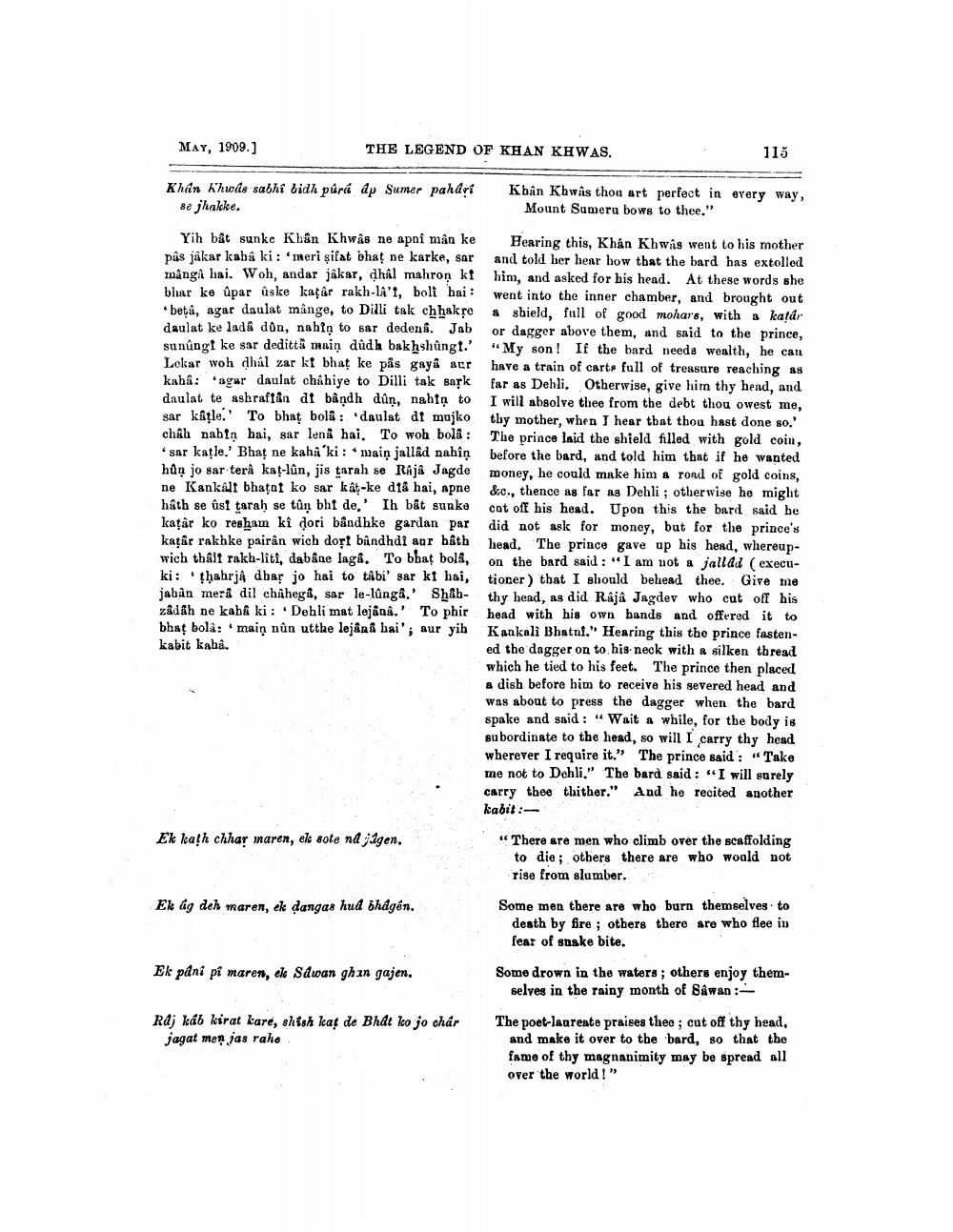________________
MAY, 1909.)
THE LEGEND OF KHAN KHWAS.
115
Khan Khwas sabhi bidh pûrá dp Sumer pahåri
se jhakke.
K bân Kbwas thou art perfect in every way,
Mount Sumeru bows to thee."
Yih båt sunke Khan Khwas ne apni man ke Hearing this, Khán Khwis went to his mother pas jákar kaba ki: "meri şifat bha ne karke, sar and told her hear how that the bard has extolled många hai. Woh, andar jakar, dhâl mahron kthim, and asked for his head. At these words she bhar ke ûpar ûske kaçar rakh-la'i, boli bai: went into the inner chamber, and brought out
beta, agar daulat mânge, to Dilli tak chhakre & shield, full of good mohars, with a katar daulat ke lada don, nabiņ to sar dedena. Jabor dagger above them, and said to the prince, sunûngt ke sar dedittà main dûdh bakhshûngt.' "My son! If the bard needs wealth, he can Lekar woh dhál zar kt bhat ke pås gaya aur have a train of carts full of treasure reaching as kahấ: agar daulat chahiye to Dilli tak sapk far as Dehli. Otherwise, give him thy head, and daulat te ashraffån at bâņdh dún, nahiņ to I will absolve thee from the debt thou owest me, sar katle.' To bhat bola : daulat at majko thy mother, when I hear that thou hast done so.' chấh nabin bai, sar lenå hai. To woh bola : The prince laid the shield filled with gold coin, *sar katle.' Bhat ne kaha ki : main jallâd nahîn before the bard, and told him that if he wanted hûn jo sar terâ kat-lun, jis tarah se Râjâ Jagde money, he could make him a rond of gold coins, ne Kankalt bhatat ko sar kât-ke dia hai, apne &c., thence as far as Dehli ; otherwise he might háth se üst tarah se tûn bht de.' Ih bât sunke cot off his head. Upon this the bard said be katar ko resham ki dori bândhke gardan par did not ask for money, but for the prince's katar rakhke pairân wich dost bindhdi aur bâth head. The prince gave up his head, whereupwich thalt rakh-liti, dabane laga. To bbat bola, on the bard said: "I am not a jallaa (execuki: thahrjá dbar jo hai to tâbi' sar ki hai, tioner) that I should behead thee. Give me jaban mera dil chahega, sar le-lùnga.' Shih- thy head, as did Râjâ Jagdev who cut off his zádkh ne kaha ki : Dehli mat lejana.' To phir head with his own hands and offered it to bhag bola: maiņ nûn utthe lejana hai'; aur yib Kankali Bhatni." Hearing this the prince fastenkabit kaba.
ed the dagger on to his neck with a silken thread which he tied to his feet. The prince then placed a dish before him to receive his severed head and was about to press the dagger when the bard spake and said: “Wait a while, for the body is subordinate to the head, so will I carry thy head wherever I require it." The prince said: “Take me not to Dehli." The bard said: "I will surely carry theo thither." And he recited another
kabit :Ek kațh chhar maren, el sote nd jagen.
“There are men who climb over the scaffolding
to die; others there are who would not rise from slumber.
Ek ág deh waren, ek dangas hud bhâgén.
Some men there are who burn themselves to
death by fire; others there are who flee in feat of snake bite.
Ek páni pi maren, ele Sdwan ghan gajen.
Some drown in the waters; others enjoy them
selves in the rainy month of Sawan :
Raj káb kirat kare, shish kat de Bhat ko jo chár
jagat men jas rahe
The poet-laureate praises thee; cut off thy head,
and make it over to the bard, so that the famo of thy magnanimity may be spread all over the world!”




